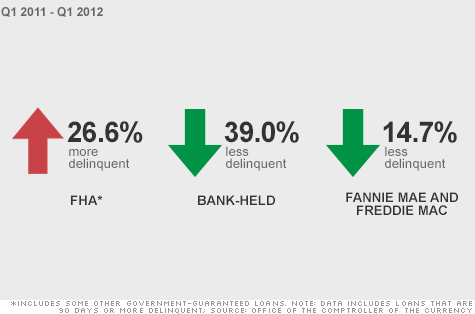Search News

Delinquencies and foreclosures of FHA-backed mortgages are soaring, putting further strain on the housing agency's finances and making a taxpayer bailout more likely.
NEW YORK (CNNMoney) -- The mortgage market appears to finally be stabilizing -- as long as you ignore loans backed by the Federal Housing Administration.
Increasingly, FHA-insured loans are falling into foreclosure or serious delinquency, moving in the opposite direction of loans guaranteed by Fannie Mae and Freddie Mac or those held by banks, which are all showing signs of improvement.
And taxpayers could ultimately be on the hook for FHA's growing number of troubled mortgages. The agency's finances are already on shaky ground, and additional losses from loans going sour could prompt the need for a federal bailout, experts said.
"We can't escape this one," said Joseph Gyourko, a real estate professor at the University of Pennsylvania's Wharton School. "This is an arm of the U.S. government."
The share of government-guaranteed loans, a majority of which are backed by FHA, that were 90 days or more delinquent soared nearly 27% during the year ending March 31. Foreclosures jumped nearly 17%, according to a report published recently by federal regulators.
At the same time, bank loans saw a dramatic improvement, with delinquencies shrinking by 39% and foreclosures declining by nearly 10%. Fannie and Freddie's portfolio also improved as delinquencies dropped by nearly 15% and foreclosures slid by more than 6%, the quarterly report issued by the Office of the Comptroller of the Currency said.
FHA has also had a tougher time successfully modifying loans. More than 48% of government-guaranteed mortgages re-defaulted 12 months after modification, compared to 36.2% of loans overall, the report said.
FHA's risky borrowers: FHA doesn't make loans, but it backstops lenders if borrowers stop paying. With this guarantee in place, banks are more likely to offer mortgages to borrowers with lower credit scores or incomes.
FHA-backed loans made up more than 29% of the market for home purchases in the first quarter of 2012, according to Inside Mortgage Finance, an industry publication.
Housing experts have been warning for years that many FHA-insured loans are not sustainable, especially in these troubled times. That's particularly concerning because FHA's share of the market has swelled in recent years as lenders pulled back on providing mortgages that weren't backed by the government.
One of the main critiques of FHA loans is that they require very low downpayments -- a minimum of 3.5%. In an environment where home prices are declining, borrowers can quickly slip underwater and owe more than their property is worth.
"These are very risky loans," said Ed Pinto, resident fellow at the American Enterprise Institute, a conservative think tank. And loans made in the past three years are "moving into the beginning of the peak delinquency period and they are very big books of business."
Unless the economy improves significantly over the next few years, FHA will experience even more delinquencies, said Guy Cecala, publisher of Inside Mortgage Finance.
Little room for failure: The dramatic jump in delinquencies comes despite the agency's efforts to improve the quality of the loans it insures.
Over the past several years, soaring defaults have been eating away at FHA's emergency reserves, which cover losses on the mortgages it insures. In fiscal 2009, the reserve fund dropped to 0.53% of FHA's insurance guarantees, well below the 2% ratio mandated by Congress. By late last year, it had fallen to 0.24%.
FHA pledged to shore up its standards and its finances in 2009. The agency has since increased its insurance premiums, established minimum credit scores for borrowers, required larger downpayments from those with credit scores below 580 and banned sellers from assisting borrowers with the downpayment. It also created an office of risk management and cracked down on lenders with questionable underwriting processes.
Despite the emergency fund's diminishing reserves, FHA maintains that its efforts are working. The loans insured starting in 2009 are much higher quality and should lower delinquency levels over time, an FHA official said.
"We expect the new books will continue with their better performance, primarily because of the steps that were put in place," he said. "And we are benefiting from having more high-credit borrowers."
Still, FHA watchers warn that the agency doesn't have much of a cushion against these rising delinquencies and foreclosures. And if the losses grow too great, the agency could need a taxpayer-funded bailout.
The FHA says that its reserves should be restored by 2014 barring a second recession, but outside experts aren't so sure.
"They are doing very badly ... there's no two ways about it," said Andrew Caplin, a New York University economics professor who has studied the agency. "Over the next five years, there won't be enough of an economic recovery to fix FHA's finances. Not a chance." ![]()
| Overnight Avg Rate | Latest | Change | Last Week |
|---|---|---|---|
| 30 yr fixed | 3.80% | 3.88% | |
| 15 yr fixed | 3.20% | 3.23% | |
| 5/1 ARM | 3.84% | 3.88% | |
| 30 yr refi | 3.82% | 3.93% | |
| 15 yr refi | 3.20% | 3.23% |
Today's featured rates: